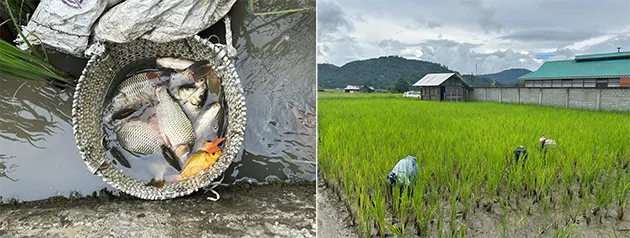[ Tarannum Ansari ]
In Ziro Valley, in Lower Subansiri district of Arunachal Pradesh, the Apatani tribe practices a unique farming method that combines rice, fish, and millets. This traditional approach reflects their deep connection to the land and showcases an innovative way of farming.
The Apatani tribe’s farming system stands out for its integration of rice cultivation with fish farming. They also grow millets, making their agricultural practices diverse and sustainable.
Rice-fish farming is a traditional practice in Ziro, where millets are also grown alongside rice. The fish, which are introduced into the rice paddies when small, grow by feeding on the organic material in the fields, including the roots of the rice plants. This natural diet ensures that the fish are healthy, and that the rice plants receive natural fertilisation from the fish waste.
This practice is entirely organic, as no external feed or chemicals are used. The fish help to keep the rice fields clean by eating weeds and pests, reducing the need for manual weeding and chemical pesticides.
Women in the Apatani tribe play a vital role in maintaining the fields. They clean and manage the crops, while men handle cooking in a small home set up within the fields. This arrangement allows them to work and eat conveniently, fostering a strong sense of community.
It highlights the tribe’s rich cultural heritage, as the method has been passed down through generations. By blending tradition with eco-friendly techniques, the Apatani tribe showcases a harmonious relationship with nature, preserving both their environment and their cultural legacy.



